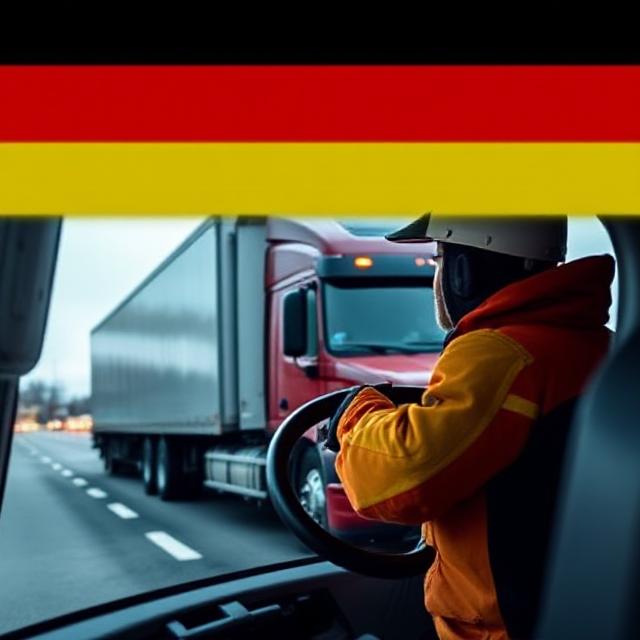Steering Your Career Towards Germany: A Comprehensive Guide for Foreign Truck Drivers
Germany, the economic powerhouse of Europe, boasts a thriving logistics sector. This constant movement of goods creates a high demand for qualified truck drivers, making it an attractive destination for skilled drivers from around the world. However, navigating the German job market and understanding the specific requirements can be challenging. This comprehensive guide aims to provide you, a foreign truck driver, with the information and resources needed to successfully apply for truck driver jobs in Germany.
I. Assessing Your Eligibility: The Foundation for Success
Before diving into the application process, it’s crucial to understand whether you meet the fundamental requirements to work as a truck driver in Germany.
- Valid Driver’s License: A valid and recognized driver’s license is the bedrock.
- EU/EEA Drivers: If you possess a driver’s license issued by an EU/EEA member state, it’s generally recognized in Germany. However, you might need to register it with the German authorities.
- Non-EU/EEA Drivers: If your license is from outside the EU/EEA, you’ll most likely need to convert it to a German driver’s license. This typically involves passing theoretical and practical exams. You can find detailed information about this process on the website of the Federal Ministry of Transport and Digital Infrastructure (Bundesministerium für Digitales und Verkehr – https://bmdv.bund.de/). You can also contact the “Fahrerlaubnisbehörde” (Driver’s License Authority) in the specific German city or region where you intend to reside.
- Certificate of Professional Competence (CPC): In Germany, truck drivers transporting goods commercially require a Certificate of Professional Competence (CPC), also known as “Berufskraftfahrerqualifikation” (BKrFQG).
- EU/EEA Drivers: Your EU/EEA CPC is generally valid in Germany.
- Non-EU/EEA Drivers: You’ll likely need to obtain the German CPC. This involves attending a training course and passing an exam. Information on recognized training providers can be found on the websites of the local “Industrie- und Handelskammer” (IHK – Chamber of Industry and Commerce). You can find your local IHK via the DIHK website: https://www.dihk.de/
- Visa and Work Permit: If you are not a citizen of an EU/EEA country or Switzerland, you will need a valid visa and work permit to legally work in Germany. The specific type of visa you require will depend on your qualifications and circumstances. The German Federal Employment Agency (Bundesagentur für Arbeit – https://www.arbeitsagentur.de/) provides detailed information about visa and work permit requirements for foreign workers. The German Missions in your home country (e.g., embassies and consulates) are also excellent resources for this information.
- Language Skills: While some employers might accept basic English, fluency in German significantly increases your chances of finding a job and integrating into the workplace. Consider taking German language courses to improve your proficiency. Numerous online and in-person language learning platforms are available. The Goethe-Institut (https://www.goethe.de/) offers German language courses and exams worldwide.
- Physical and Mental Fitness: Truck driving is a demanding profession. You will need to undergo regular medical examinations to ensure you meet the required physical and mental fitness standards. These examinations are typically arranged by your employer or required as part of the CPC process.
- Clean Driving Record: A clean driving record is essential. Any history of serious traffic violations or accidents could negatively impact your chances of employment.
II. Finding Truck Driver Jobs in Germany: Where to Look
Once you’ve confirmed your eligibility, the next step is to actively search for suitable job opportunities. Several online platforms and recruitment agencies specialize in connecting truck drivers with employers in Germany.
- Online Job Boards:
- Indeed: https://de.indeed.com/ – A comprehensive job board with a large selection of truck driver positions.
- StepStone: https://www.stepstone.de/ – Another popular job board offering a range of driver jobs, including those for truck drivers.
- Monster: https://www.monster.de/ – A well-known job board with a dedicated section for logistics and transportation jobs.
- LinkedIn: https://www.linkedin.com/ – Use LinkedIn to connect with recruiters, follow companies, and find job postings.
- Bundesagentur für Arbeit (Jobbörse): https://www.arbeitsagentur.de/jobsuche/ – The official job board of the German Federal Employment Agency. This is a reliable source for legitimate job postings.
- Specialized Recruitment Agencies: Several recruitment agencies specialize in placing foreign truck drivers in Germany. These agencies can provide valuable support with the application process, visa requirements, and language assistance.
- Consider searching on Google for “Truck Driver Recruitment Agency Germany” or “LKW Fahrer Vermittlung Deutschland” to find agencies that specifically cater to foreign drivers. Due diligence is advised before engaging with any agency; check reviews and ensure they are reputable.
- Company Websites: Directly visiting the websites of logistics companies (Speditionen) and transport companies can uncover unadvertised job openings. Research companies that operate in your desired region of Germany and explore their careers pages.
III. Crafting a Winning Application: Showcasing Your Skills
Your application is your first impression. It needs to be clear, concise, and compelling, highlighting your skills and experience in a way that resonates with German employers.
- Resume (Lebenslauf):
- Format: Use a clear and professional format. The Europass CV format (https://europa.eu/europass/en) is widely recognized and accepted in Germany.
- Content:
- Personal Information: Include your full name, address, phone number, email address, and nationality.
- Work Experience: Detail your previous truck driving experience, including the types of vehicles you’ve driven, the routes you’ve covered, and the goods you’ve transported. Quantify your achievements whenever possible (e.g., “Drove over 100,000 kilometers annually with a 99% on-time delivery rate”).
- Education and Training: List your relevant education and training, including your driver’s license type, CPC certification, and any other relevant certifications.
- Skills: Highlight your relevant skills, such as:
- Safe driving practices
- Knowledge of traffic regulations (German/European)
- Route planning and navigation
- Vehicle maintenance and troubleshooting
- Loading and unloading procedures
- Customer service
- German language skills (level)
- References: Include contact information for previous employers who can provide references.
- Cover Letter (Anschreiben):
- Tailor to the Job: Customize your cover letter for each specific job you apply for. Research the company and address their specific needs and requirements.
- Highlight Your Strengths: Emphasize your relevant skills and experience that align with the job requirements. Explain why you are a good fit for the company and the role.
- Show Enthusiasm: Express your genuine interest in the position and the company.
- Language: Unless the job posting explicitly states otherwise, write your cover letter in German. If your German isn’t perfect, consider having it proofread by a native speaker.
- Supporting Documents:
- Copies of your driver’s license, CPC, and other relevant certifications.
- A copy of your visa and work permit (if applicable).
- Translations: If your documents are not in German, provide certified translations.
IV. The Interview Process: Putting Your Best Foot Forward
If your application is successful, you’ll be invited for an interview. This is your opportunity to impress the employer and demonstrate your suitability for the role.
- Preparation is Key:
- Research the Company: Understand their operations, values, and culture.
- Prepare Answers to Common Interview Questions: Practice answering questions about your experience, skills, and motivations. Be ready to discuss your strengths and weaknesses.
- Prepare Questions to Ask the Employer: Asking thoughtful questions shows your interest and engagement.
- Professionalism:
- Dress Code: Dress professionally and appropriately for the interview.
- Punctuality: Arrive on time for the interview.
- Communication: Communicate clearly and confidently. Maintain eye contact and listen attentively to the interviewer.
- Language: Communicate in German, unless otherwise instructed.
- Showcase Your Expertise: Highlight your driving experience, your knowledge of traffic regulations, and your commitment to safety.
V. Post-Offer Procedures: Securing Your Future in Germany
Once you’ve received a job offer, there are several important steps to take to secure your future in Germany.
- Review the Contract Carefully: Thoroughly review your employment contract to understand your salary, working hours, benefits, and other terms and conditions. If you are unsure about any aspect of the contract, seek legal advice.
- Complete Necessary Paperwork: Complete all necessary paperwork related to your visa, work permit, and registration with the local authorities. Your employer should be able to provide assistance with this process.
- Find Accommodation: Secure accommodation in your new city or town. Many employers can assist with finding temporary or long-term housing.
- Register with Health Insurance: Health insurance is mandatory in Germany. Register with a public or private health insurance provider.
- Open a Bank Account: Open a bank account in Germany to receive your salary and pay your bills.
VI. Resources and Support:
- Make It In Germany: https://www.make-it-in-germany.com/en/ – An official website providing information and resources for skilled workers from abroad.
- The Federal Office for Migration and Refugees (BAMF): https://www.bamf.de/EN/Start/start_node.html – Provides information on immigration and integration in Germany.
- German Trade Union Confederation (DGB): https://www.dgb.de/ – Represents the interests of workers in Germany and provides advice on employment rights and labor laws.
Conclusion:
Applying for truck driver jobs in Germany as a foreigner can be a complex process. However, with careful planning, thorough preparation, and the right resources, you can significantly increase your chances of success. By addressing the eligibility requirements, utilizing online job boards and recruitment agencies, crafting a compelling application, and performing well in the interview, you can steer your career towards a rewarding future in the German logistics sector. Remember to prioritize language skills, obtain necessary certifications, and familiarize yourself with German labor laws and regulations. Good luck on your journey!



